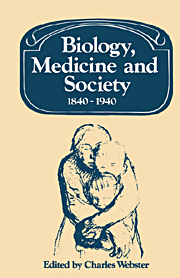Book contents
- Frontmatter
- Contents
- Contributors
- Preface and Acknowledgements
- Introduction
- 1 Women's Health and the Women's Movement in Britain: 1840–1940
- 2 Working-Class Mothers and Infant Mortality in England, 1895–1914
- 3 Theories of the Cell State in Imperial Germany
- 4 Innate Character in Animals and Man: A Perspective on the Origins of Ethology
- 5 Genetics in the United States and Great Britain 1890–1930: A Review with Speculations
- 6 Eugenics and Class
- 7 Sociobiologies in Competition: The Biometrician–Mendelian Debate
- 8 Psychologists and Class
- 9 Measuring Intelligence: English Local Education Authorities and Mental Testing 1919–1939
- Index
3 - Theories of the Cell State in Imperial Germany
Published online by Cambridge University Press: 02 December 2009
- Frontmatter
- Contents
- Contributors
- Preface and Acknowledgements
- Introduction
- 1 Women's Health and the Women's Movement in Britain: 1840–1940
- 2 Working-Class Mothers and Infant Mortality in England, 1895–1914
- 3 Theories of the Cell State in Imperial Germany
- 4 Innate Character in Animals and Man: A Perspective on the Origins of Ethology
- 5 Genetics in the United States and Great Britain 1890–1930: A Review with Speculations
- 6 Eugenics and Class
- 7 Sociobiologies in Competition: The Biometrician–Mendelian Debate
- 8 Psychologists and Class
- 9 Measuring Intelligence: English Local Education Authorities and Mental Testing 1919–1939
- Index
Summary
The cell as a social concept now normally refers to a unit of political organization. But the concept of an organism as a cell state, or Zellenstaat, has a neglected history associated with the rise of cell biology in nineteenth-century Germany. Professors of anatomy propagated the theory that an organism was a ‘social arrangement of parts’ both in their teaching and as a means of scientific explanation in their research. Moreover on the basis of their privileged social position many professors drew on biological theories to formulate opinions on national issues like the feminist movement, naval expansion or war strategy. German scientific achievements in cell biology may be considered as a form of nationalism, if it is accepted that social ideals were intrinsic to the scientific formulation of concepts of life.
That the theory of the cell as the elementary organism permeated other aspects of culture raises questions about the prestigious authority of science in Imperial Germany. Relations between scientific theory, institutional aspects of teaching and research, and broader social questions pose complex historical problems. German universities were to a considerable extent state financed and controlled. But academics also vociferously defended their privileges, arguing that German scientific achievements were the result of national traditions of academic freedom. The resulting conflict of interests raises the question examined here with regard to anatomy from the 1880s to 1918 at Berlin: to what extent was the theory of the cell state a response to the state's institutional control of the universities?
- Type
- Chapter
- Information
- Biology, Medicine and Society 1840–1940 , pp. 99 - 156Publisher: Cambridge University PressPrint publication year: 1981
- 21
- Cited by



